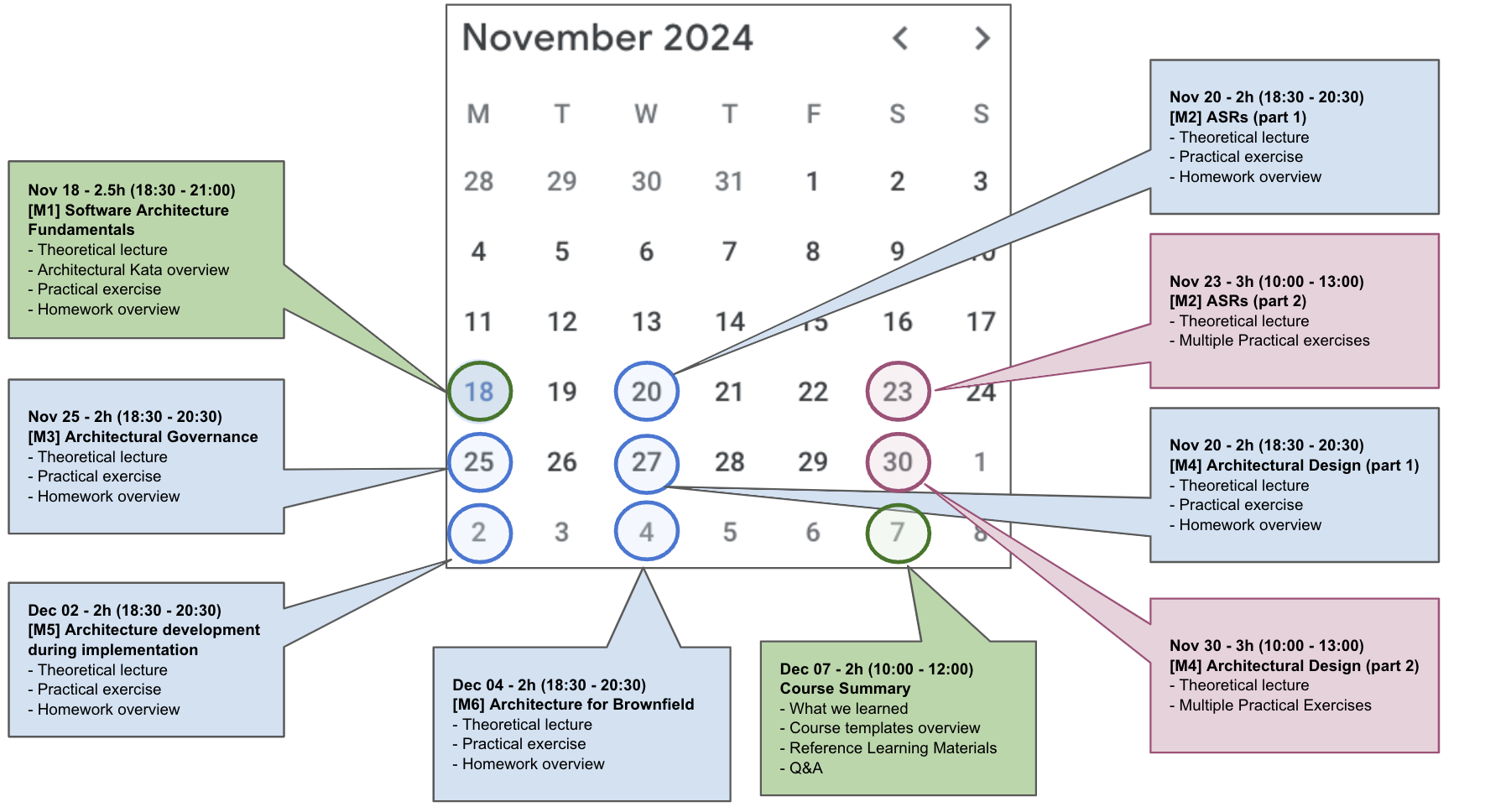Course: Software Architecture Design in practice

Buy tickets for the next conference Highload fwdays'26 conference!
All tickets for this course have already been sold. But we're already planning the next iteration! Leave your data in the Waiting list and we will contact you as soon as the dates of the repeat course are available:
The course consists of 6 modules, which include a description of all stages of software architecture development: from developing a design for a new product to aspects of evaluating and improving the architecture of an existing product.
Mentor - Oleksandr Savchenko, Solutioning Director at Ciklum, practicing architect, speaker at global conferences and author of courses.
Architecture is the foundation of any software product. It defines the main components, their relationships and those rules that ensure the correct and efficient operation of the entire system.
That is why it is important for engineers not only to understand what architecture is, but also to know in detail the process of its development. All developers in one way or another face either the architecture of individual programs/services (Application Architecture), or the architecture of the entire product (Solution Architecture), or even the architecture of the entire company (Enterprise Architecture).
The software architecture development process is a structured approach to creating a blueprint for a system that ensures it meets all business requirements and quality metrics.
It begins with an requirement analysis: functional and non-functional, which define what the system must do and how, and the identification of Architecturally Significant Requirements (ASR). At the same time, non-functional requirements (for example: performance, security, reliability) often influence architectural decisions more than functional ones, because they determine the boundaries and direction of the design.
This is followed by design (analysis of alternative solutions and selection of the most suitable), which includes the choice of architectural style, architectural patterns, development of infrastructural aspects, detailed technical aspects of each of the components and all aspects of development. A parallel stage is the documentation of architectural decisions, which includes the creation of diagrams and descriptions (ADRs) that demonstrate the structure of the system, the relationships between components, interaction protocols, and rules for the distribution of responsibilities.
Transparent and understandable documentation helps all team members understand and follow a single architectural vision during implementation - developing components according to the chosen architecture. The Architect's work does not end here and it is very important to continuously improve the architecture with a focus on an evolutionary approach, and not on technologies that change very rapidly.
Also an important stage is checking the architecture and implementation for compliance with requirements and constraints. This may include modeling, prototyping, or architectural reviews that analyze potential risks and ways to minimize them.
Audience:
- architects who want to find new approaches and structure their knowledge
- business and system analysts
- DevOps
- testers
- project managers
- engineering managers
- CTO
Required knowledge:
- experience in IT 3+ years
- experience with online boards (preferably Miro)
- intermediate level of engineering English (all educational and template materials are in English).
Why should people who have participated in previous courses/workshops come?
- Course modules are more focused on giving practical skills that can be used as soon as possible
- Revised and improved modules of previous courses with a focus on practical use at work (for example, the module on Requirements Analysis (identifying ASRs) gives a clear picture of how to describe all ASRs and how to link them together based on templates, as identify risks and describe assumptions)
- Removed descriptions of legacy methodologies and frameworks, with a focus only on actual methods that should be implemented now
- New Architectural Kata, which will include design development and integration of AI components, Data integration patterns
- A new approach to doing online exercises in Architectural Kata
New topics:
- The process of introducing the Architectural Department (Design Committee)
- AI Reference Architectures and Architectural Styles/Patterns
- ADR implementation process
- Preparation for implementation and creation of a development strategy
- Building a detailed test strategy
- Preparation for release
- Specifics of architecture design/improvement for the existing project (architecture design for Brownfield)
Format:
Date and time: November 18 - December 7, classes on Mondays, Wednesdays and Saturdays.
How it will take place: Lecture, Q&A, group practice.

Platform: Zoom. We will send you a link to the broadcast on the eve of the course, and it will also be available on this page.
Language of the event and presentation: Ukrainian
The number of participants is limited
Course Schedule
Module 1 - Software Architecture Fundamentals
Module 2 - Architecturally Significant Requirements (ASRs)
Module 3 - Architectural Governance
Module 4 - Architectural Design
Module 5 - Architecture Implementation
Module 6 - Architecture for Brownfield

Mentor: Oleksandr Savchenko
— More than 16 years in IT (inc. 8+ years in enterprise and software architecture)
— Hands-on Software Architect, Solutioning Director.
— Speaker at global conferences, author of software architecture courses and workshops, has taught more than 500 people in the last year, which helped them delve into Architecture
— Went from developer to delivery director, head of departments
— Managed departments with 300+ people, led big programs (150+ engineers) from different business domains, modern technology stacks and complexity
— SEI/TOGAF/ITIL trained specialist, ICAgile Certified Professional, AWS accredited specialist
— For the past 2.5 years, he has been actively volunteering and participating in various projects that help the Armed Forces and civilians throughout Ukraine

